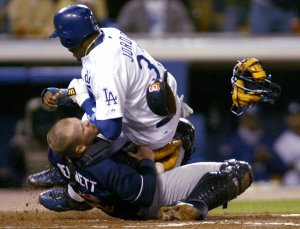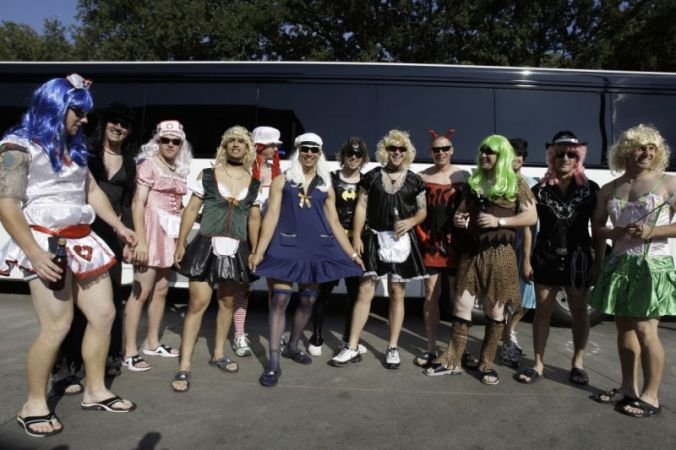Every year, Major League Baseball teams indulge in a high-profile, stupid and offensive ritual by forcing their rookies to dress in ridiculous costumes as they travel home after their final road trip. This is hazing, the team’s veterans humiliating the team’s young players and forcing them to show proper deference and character by submitting to it. Most of the time, the humiliation involved dressing in drag, because, as every red-blooded American male knows, nothing is worse than being compared to a woman. Continue reading
MLB
Ethics Hero: Major League Baseball
 At least one major league sport cares about its players’ health more than it does about highlight films.
At least one major league sport cares about its players’ health more than it does about highlight films.
Today Major League Baseball announced that it will be banning collisions at home plate, one of the most exciting plays in baseball, and one of the most dangerous. The violent and unpredictable convergence of large human bodies created when runner and ball arrive at home plate nearly simultaneously as a catcher positions his body to receive a throw while blocking access to the plate have decided games and championships, but wrecked careers and, quite possibly, brains. Football’s frightening record of player dementia prompted baseball to check its records, and there was tell-tale evidence that concussions take their toll on ex-catchers as well.
Last season, for the first time, baseball required players suffering concussions to stay on a special disabled list until they were cleared to play after a head examination. The new ban represents more progress.
The rules change will probably take this form, according to ESPN: Continue reading
Deriliction of Duty at the MLB All-Star Game.
This week’s Major League Baseball All-Star Game got the lowest TV ratings in the history of the so-called “mid-summer classic,” which proves that Lincoln was right: you just can’t fool all the people all of the time—even when they are baseball fans. The All-Star Game was originally devised as a dream competition in which the best players from the American and National League would play a game that was hard-fought and full of the spectacular exploits of the best players alive. For decades it was like that, too, until sky-rocketing salaries and America’s culture of celebrity turned a large proportion of the players into egomaniacal, self-promoting monsters. Continue reading
LaBron, Steinbrenner, and Warped Sports Ethics
Sports ennoble us through the symbolic exploits of latter-day mythic heroes, who use their amazing skills and talents to exemplify courage, grace under adversity, loyalty, accountability, sacrifice, and, of course, sportsmanship.
Or so they say.
Sometimes it works out that way, but just as often an extraordinary athlete like LeBron James will choose to use his prominence to promote less attractive character traits, like greed, vanity, disloyalty, cruelty and boorishness. For some reason, the mega-millions LeBron was going to receive for fleeing Cleveland as an NBA free agent was not sufficient booty: the basketball star felt that “branding” required that he tease as many cities and franchises as possible, rub Cleveland’s loss in the faces of his previously worshipful fans in that city, and then announce his final choice of new employers in an ESPN TV special that embarrassed his sport and his species. James is not alone, of course; he has lots of company among college and professional athletes whose preening and selfishness make it impossible to use their names and “role model” in the same sentence.
But for the use of sport to warp ethical priorities, nothing quite matches the nauseating accolades being heaped on the late George Steinbrenner, whose ownership of the New York Yankees was a decades-long advertisement for the principle that the end justifies the means, and as long as you win, nothing else really matters. Continue reading
